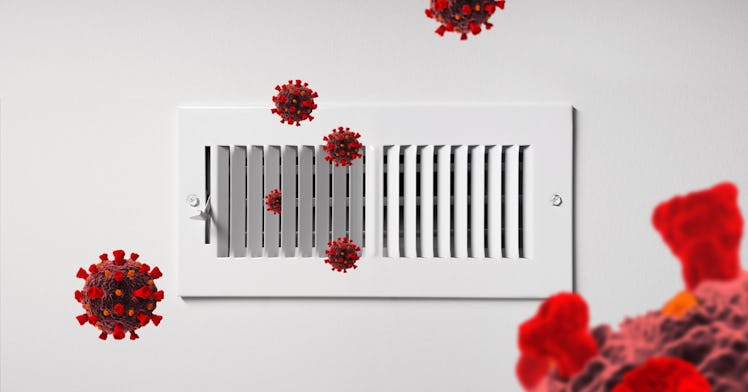It’s probably less safe indoors than we thought.
Though it’s well-known that being indoors is a major cause of COVID-19 spread because of extended proximity to others, little did we think about the role that air conditioning might play. That’s right. Air conditioners might help recirculate the virus by pushing it around an enclosed area. Just when you were ready to go back to the office…
How much evidence is there that this is happening? Frankly, not much. Theoretically, experts say it’s possible. “As people go indoors in hot weather and the rebreathed air fraction goes up, the risk of infection is quite dramatic,” Edward Nardell, an infectious disease expert at Harvard Medical School, told The Harvard Gazette about infectious diseases with airborne potential, which likely includes COVID-19. There’s some real-life evidence too: A study in China, for example, found that one presymptomatic person at a restaurant infected nine others, most of them probably through the restaurant’s air conditioning.
But just how prevalent this is hinges on whether the coronavirus is airborne — in other words, whether it can stay in the air for extended periods of time. It’s best to assume that it is. A group of 239 scientists from 32 countries wrote an open letter stating that the virus can become airborne “beyond any reasonable doubt.” They urged the World Health Organization and other health agencies to recognize the potential for airborne transmission. As a result, the WHO admitted the possibility and stated that there is “emerging evidence” for it on Thursday.
Many have criticized the WHO and CDC’s slow response to the evidence. Because they “have been so slow to acknowledge aerosol transmission is happening, buildings are not using appropriate control measures,” Joseph Allen, a professor of exposure assessment science at Harvard T.H. Chan School of Public Health, told CNN. Air conditioning is one such example.
If you have an air conditioning unit that recycles air your home, called a split unit, you can reduce the COVID-19 risk by turning off the AC when possible. But if you can’t take the summer heat, open the window while the air conditioning is running, Shaun Fitzgerald, a fellow at the Royal Academy of Engineering, told The Telegraph. Yes, it’s wasteful. But even a gentle breeze can increase ventilation and safety, Fitzgerald said. If you’re worried, you can also purchase an air purifier that filters out viruses. Don’t rely on air conditioning systems that claim to have germicidal properties because these claims are not tested, according to The Telegraph. And keep humidity between 40 percent and 60 percent, a sweet spot for shorter coronavirus survival, according to CNN.
The bigger air conditioning risk is in larger buildings with more people. Stay away from indoor public spaces such as restaurants and retail stores. In places you have to spend time in, such as the office, air purification can help.
Air conditioning probably isn’t a major source of transmission, experts say. But building managers should still take precautions. “The prudent and pragmatic approach is to acknowledge that airborne transmission is happening and put in the controls. If we find out in five years that airborne was 5% of transmission, then OK,” Allen said. “But what if it’s 20% or 30% and we failed to acknowledge it? That’s a problem.”
